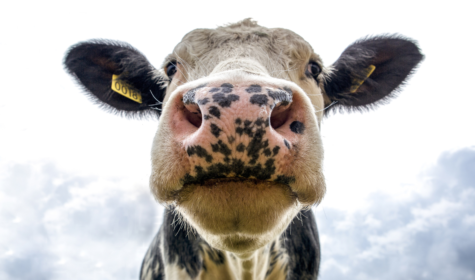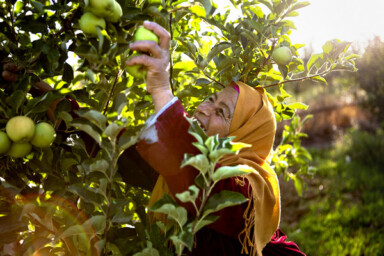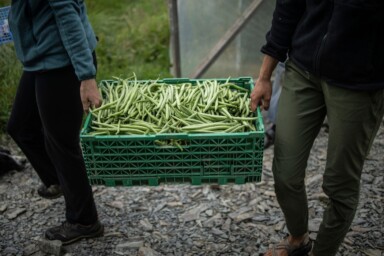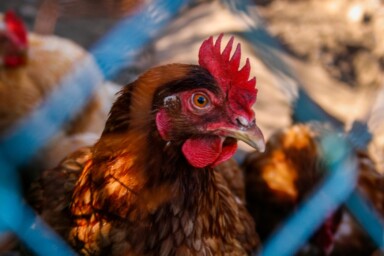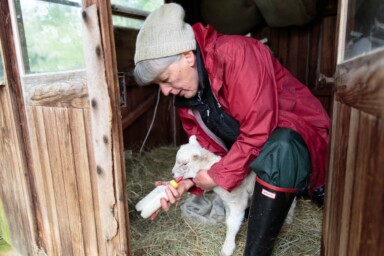The current UK government has recently been reassuring the British public that it is ‘committed to maintaining our position as world leaders in animal welfare.’ The fact that they are making these commitments is an indication that the shocks of Brexit and COVID-19 have changed public attitudes towards food sustainability, welfare and health.
Claims such as ‘world leader in animal welfare’, and ‘world-leading animal welfare standards’, have been significant factors mobilising public opposition to a watered-down trade deal which could open our doors to imported livestock products that fall below the relatively high British standards. But in winning the immediate battle – if we do win it – against chlorinated chicken and other industrial livestock products finding their way into our supermarkets, perhaps we need to be mindful that there is still a very long way to go in living up to the claims of being a world leader in animal welfare standards.
It’s certainly true that historically, the UK has been at the forefront of policy, advocacy and scientific development in animal welfare. It was the first country in the world to pass a law protecting animals (the 1822 Act to Prevent the Cruel and Improper Treatment of Cattle), and shortly after, the first country in the world to found an animal welfare charity (in 1824, the Royal Society for the Prevention of Cruelty to Animals). In 1965, the British government appointed a commission to investigate the welfare of farmed animals, spurred by the writings of British animal welfare activist Ruth Harrison about the intensive livestock sector. The resulting Brambell Committee report led to the development of the ‘Five Freedoms’, a framework of animal welfare assessment that continues to be used around the world to this day. The UK has been a major player in influencing progressive EU animal protection laws, such as the recognition of sentience, banning veal crates and barren battery cages, and a partial ban of sow stalls (which the UK banned completely). Some of the founding figures of animal welfare as a scientific discipline – the likes of Professors Marian Dawkins and Donald Broom – worked at (and continue to work at) leading UK universities.
This is definitely a history that the UK should be proud of. But it is surely a little disingenuous for Government to insist that Britain remains a world leader in animal welfare and food safety standards when a significant percentage of our livestock farms are still relatively intensive, with animals permanently housed, fed on genetically modified crops and routinely treated for therapeutic reasons with antimicrobial drugs.
In saying this, it needs to be stressed that we can hardly blame the farmers, many of whom are competing in a world where ruminant animals have been demonised for their methane emissions and profits are hard to maintain. This has pushed them to intensify, and a number are putting up intensive chicken sheds in many parts of the west of Britain right now. They, like anyone who is running a business, have to follow the money and right now the most profitable option is to invest in these relatively intensive operations.
It would be more justified to criticise the government, who during the Brexit negotiations, fell at the first hurdle by failing to incorporate the recognition of sentience, enshrined in EU law, into UK legislation via the EU Withdrawal Bill despite several proposed amendments to include this. Instead the government said it would ‘consider’ how it ‘might’ reflect sentience in wider legislation. Since then, it attempted to shoehorn sentience into draft legislation on animal cruelty sentencing, which was argued to be ‘flawed, ambiguous, rushed and hastily incorporated’, and was therefore removed and continues to be absent from UK legislation. Not a very promising start to the country’s EU-free animal welfare ambitions.
The next failure came with the introduction of the highly anticipated Agriculture Bill in Parliament. While the addition in the Bill of animal welfare as a ‘public good’ that could be financially incentivised is very welcome, the actual wording is that financial assistance ‘may’ be given for protecting and improving livestock health and welfare, leaving room for the government to wiggle out of this commitment. There is also nothing concrete in the Bill to ensure the phasing out of the use of intensive systems which do not deliver the UK Farm Animal Welfare Committee’s ambition for a ‘good life’ for all farmed animals. Compassion in World Farming outlines several further areas in which the Bill is lacking, in terms of animal welfare.
The inability to prevent cheap imports produced to poorer animal welfare standards from entering the UK market will force UK farmers to adopt lower welfare standards in order to compete. It hardly needs saying that this will not only threaten the welfare of millions of farm animals in the UK, but also increase demand for lower welfare imports, thus supporting production systems that inflict suffering on animals. More encouragingly, the successful campaign supported by the Mail on Sunday, Jamie Oliver and others, along with many peers in the House of Lords who have spoken out against the lack of protection for UK standards, offers some hope for the future.
For both the farming community and the public these are extremely sensitive issues. For one section of the public, it could be argued that a key driver behind the trend towards vegetarianism and veganism is their instinctive and arguably legitimate concern that the story behind many livestock products would not bear close scrutiny. For the other larger section, which most likely currentlycomprises the majority of the public, rather than grasp the nettle of demanding livestock products which have high welfare credentials, they continue to be driven by price. In the meantime, the farmers are caught in the middle, wanting to produce to higher welfare standards, but trapped into becoming commodity slaves by the relentless drive for cheap food and the threat of imports of a lower standard.
But the question remains, how can we be ‘world leaders’ in animal welfare if, as a society, we say treating animals in a certain way is wrong (represented in our laws), but we support it anyway by giving our custom to it, thereby encouraging poor welfare practices elsewhere, imposed on animals out of sight and out of mind?
As well as failing to consolidate EU laws into our own, we continue to fall behind other European countries in terms of farm animal protection. In 2014, World Animal Protection’s Animal Protection Index (API), a ranking of countries on their commitment to protect animals in their legislation, improve animal welfare and recognise animal sentience, scored the UK the highest possible score (A) for legislation protecting farm animal welfare. The second and latest ranking, carried out in 2020, demoted the UK to score D (where G is the lowest possible score). No countries scored A, but Sweden and Austria scored B, and Denmark, Switzerland and Poland scored C. Thus, other European countries have overtaken the UK in providing legislative protection for farm animal welfare. The UK has been knocked off its podium, as demonstrated by the NGO and academic animal welfare experts behind the API. ‘The UK government is failing to keep up with the latest science on animal welfare and has been treading water, making promises of new legislation on animal sentience that have not been met,’ explained Sonul Badiani-Hamment, World Animal Protection UK external affairs adviser.
Just one example of the way other countries are leading in farm animal welfare protection involves ‘mutilations’ – removal of parts of an animal, such as the tip of a bird’s beak, or a pig’s curly tail. These painful and stressful procedures are carried out to treat the symptom of an animal welfare problem (e.g. feather pecking in hens and tail biting in pigs), not the cause of it (e.g. the lack of mental and physical stimulation and inability to perform natural, highly motivated behaviours such as foraging). Sweden, Norway and Finland have banned beak trimming of poultry, and tail docking of pigs (Switzerland have also stopped tail docking). In comparison, mutilations are still routinely carried out in the UK, with an estimated 84% of the British pig population being tail docked.
To conclude, the current UK government’s claim to be a world leader in animal welfare may have once been justified but can no longer be defended today. To ensure that the government can once again live up to this claim we, the public, need to play our part. We need to exercise our purchasing and citizen power in combination. We should only eat livestock products produced in systems with the highest standards of sustainability and welfare. We must also demand that government plays its part in protecting our farmers from lower standard imports. If we do both these things, we will ensure that the torch we once proudly held does not dwindle and splutter to the point where it is merely a torrent of empty words. To protect animals in this country and around the world, we must demand from those in power ‘a little less conversation, a little more action please’.
